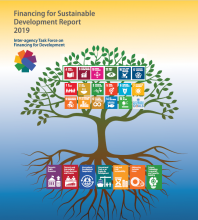UN report says global tax system needs urgent reform

One of the most important conclusions of the UN’s report is that “Tax revenues are insufficient, and tax rules are inadequate given digitalization” and “small and poor countries are not adequately included in international tax architecture reform efforts”.
Current reforms have barely scratched the surface of the issue of tax avoidance and populations all over the world are growing tired of weak and partial answers. The UN report is published as the debate on the reform of the international tax system is in full swing as the work of the Organization for Economic Cooperation and Development (OECD), through the Inclusive Framework, on the challenges of taxing the digital economy continues. The OECD recently acknowledged that new solutions would have to move beyond the arm’s length principle. Further pressure has been put on the work of the OECD by the recent publication of by the International Monetary Fund (IMF) of a policy paper, “Corporate taxation in the global economy”, which recognized that the international corporate tax system is no longer fit for purpose.
The most shocking aspect of multinational tax avoidance is the fact that it is often done legally. Multinationals fix the prices of transactions between their subsidiaries (so called transfer pricing/arm’s length pricing) to guarantee that their revenues are taxed in countries where tax rates are lower – and not where their economic activity and the creation of value really take place. This way, they are able to concentrate enormous profits in just a handful of tax havens thanks to a powerful industry of intermediaries – banks, consultants and law firms. Estimates show the total amount stashed away offshore is likely to be around USD$20-30 trillion.
As outlined in a recent report from the Independent Commision for the Reform of International Corporate Taxation (of which PSI is a founder), the fairest and most effective approach is for multinationals to be taxed as single firms doing business across international borders. A simple, formulaic approach would ensure that global profits and associated taxes could then be allocated according to objective factors such as the sales, employment, resources (and even digital users) used by the company in each country, rather where they locate their different functions and claim their Intellectual Property. This proposal, combined with a global effective minimum tax of 20-25% would drastically reduce the financial incentives for multinationals to shift profits between jurisdictions and for countries to cut their tax rates.
PSI General Secretary, Rosa Pavanelli said:
"The SDGs can only be met if the international tax system is overhauled, with the involvement of developing countries, to ensure the rich pay their fair share to fund the vital public services such as healthcare and education which are the very basis of development."
Today’s reality is that the OECD is playing the leading role in shaping tax standards. In addition to our concerns on the legitimacy of the OECD vis a vis the United Nations, we are worried about the way developing countries are allowed to be engaged in the shaping of global tax standards. Given that corporate tax avoidance affects developing countries relatively more, it is critical that they become rule makers and not simply rule takers.
PSI and ICRICT also call for the creation of a global asset registry. It would prove a vital tool against illicit financial flows, by ending impunity for removing legitimate income and profits from the economy in which they arise for tax purposes. You can read about why, how and where it should be implemented in our latest report, “A Roadmap for a Global Asset Registry”.

